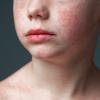Measles is one of the most contagious diseases still in existence. It is caused by the measles virus. You can get measles if you have not had the disease before, or if you have not been vaccinated against measles. Children can be vaccinated against measles. As a result, the disease is no longer common in the Netherlands.
What should I do if I think that my child has measles?
It is important to prevent measles from spreading. Some people have a higher risk of becoming seriously ill from measles. This includes babies, young children, pregnant people and people with impaired immunity. Measles is very contagious, so please follow these recommendations:
- If your child is ill, keep your child at home!
- Do you think your child might have measles? Or does your child have a spotty rash? Keep your child home up to and including 4 days after the spots appear. Call the GP if you suspect that your child has measles. Do not go to the GP practice.
- If your child has brothers and sisters who have not been vaccinated and have not had measles before, keep those children home too. Do not let them play with their friends.
- Do not visit other people and do not receive visitors in your home. This also applies to your family and friends.
- If you (or your child) are not vaccinated and have not previously had measles, then stay away from young babies, pregnant people, and people with impaired immunity.
How can I recognise measles?
Measles starts suddenly. The first symptoms can include:
- fever
- feeling ill
- nasal cold
- coughing
- sore, inflamed eyes (sensitive to bright lights)
- small white spots in the mouth (1 in 3 patients)
A rash of red spots emerges after 3 to 7 days. The rash starts behind the ears and then spreads all over the body. The measles rash feels rough, like sandpaper.
Measles can sometimes cause a middle ear infection. In severe cases, the patient can develop pneumonia or encephalitis (inflammation of the brain). In very rare cases, measles can lead to a form of encephalitis that does not appear until several years later. This delayed form of encephalitis is fatal.
Who can become very ill from measles?
Some people have a higher risk of severe symptoms:
- Very young children. This especially applies to young babies born to mothers who are not vaccinated themselves and have never had measles. These infants have an increased risk of severe illness and death.
- Older adults: the likelihood of hospital admission increases as a person gets older.
- Children with severely impaired immunity. They are at risk for a very serious and potentially fatal infection.
- Pregnant people who are not vaccinated against measles and have never had measles themselves. Measles does not cause birth defects in children. In rare cases, however, it can lead to miscarriage or premature birth.
In the Netherlands, the risk of dying from measles is about 1 in 10,000 cases. About 250 children die of measles every day in developing countries.
After recovery, measles patients are also more vulnerable to other infectious diseases for months or even years.
How might I catch measles?
The measles virus is found in the throat of an infected person. When a person with measles coughs or sneezes, tiny droplets containing the virus are expelled into the air. If other people inhale the droplets, they could become infected.
People can transmit the virus as soon as the first symptoms start. They remain contagious for up to 4 days after the measles rash first appears.
Measles is one of the most contagious diseases still in existence. It is much more contagious than flu, for example. The incubation period between exposure and illness is 7 to 14 days. It usually takes 10 days to start showing symptoms.
How can I prevent measles?
There is a vaccination against measles: the MMR vaccination. This vaccination is offered to children in two doses: at 14 months and at 3 years. It also protects against mumps and rubella. The MMR vaccine has been in the National Immunisation Programme since 1976.
Children who have not yet been vaccinated against measles can still catch up on the MMR vaccinations until their 18th birthday, free of charge. To get vaccinated, make an appointment with your local Youth Healthcare Services.
Adults who have not had measles and have not been vaccinated against measles can also be vaccinated, at their own expense. Contact the Municipal Public Health Services (GGDs), your family doctor or a vaccination clinic for more details.
Once a person has had a measles infection, they cannot get the disease a second time. Sometimes a person who has been vaccinated against measles still gets an infection, but their illness is usually less severe.
Is there any treatment for measles?
There is no treatment for measles. The body has to clear the virus on its own. Most people feel better after 7 to 10 days. Some patients develop more serious illness. Call the GP if you suspect that you or your child have measles.
How common is measles in the Netherlands?
A vaccination against measles has been in the National Immunisation Programme since 1976. Before the measles vaccine was introduced, almost everyone got measles in childhood. The Netherlands had hundreds of thousands of measles patients every year.
Since we started vaccinating children against measles, the disease has become much less common. There are usually 10 to 20 patients a year. Many of these have been in a country where measles is more common. There is an epidemic about once every 10 to 15 years. When that happens, measles is most likely to spread in areas where fewer people are vaccinated. The last measles outbreak in the Netherlands was in 2013/2014. During that outbreak, more than 180 measles patients were admitted to hospital. One 17-year-old girl died of the consequences of measles. RIVM is closely monitoring the spread of measles and posting updates on the current situation on the website.
Can a person with measles go to childcare, school or work?
No, a person with measles cannot go to children, school or work. If you suspect that your child has measles, keep the child at home and call the GP.
If your GP says that your child has measles, tell the childcare provider or teacher. They can consult with the Municipal Public Health Services (GGDs) to notify other parents.
If you are an adult and suspect you might have measles, stay home and call your GP. If the GP says that you do have measles, consult with the company doctor, the GGD or your employer before returning to work.
Video: What is measles
Video: What is measles
Voice-over: Measles is a very contagious disease. It always includes a rash.
You can get measles from a person who is infected with the measles virus.
This virus is found in the nose and throat.
It can spread through the air by coughing, sneezing and talking.
Measles starts with a fever, nasal cold and coughing.
After 3 to 7 days, a spotty rash starts behind the ears and then spreads all over your
body.
You will be feverish and may become very ill.
Thankfully, measles usually goes away on its own, without medication.
If you do become seriously ill, you could also develop pneumonia or encephalitis
(inflammation of the brain).
You might even die.
Most children in the Netherlands are vaccinated against measles.
They get two injections: the first at 14 months and the second at 3 years.
Would you like to know more? Go to RIVM.nl/en/measles
Outro: logo National Institute for Public Health and the Environment. Ministry of Health, Welfare and Sport.




